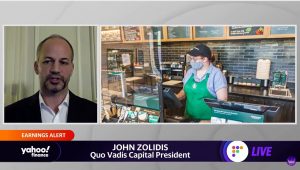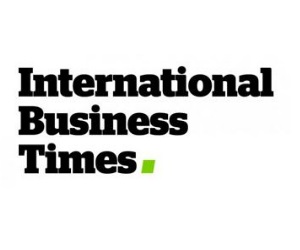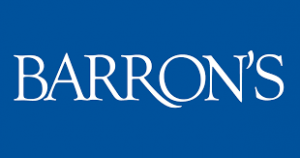
Starbucks: Reduced hours are ‘costing the company,’ Quo Vadis Capital president says
Please click the link below to view our interview with Yahoo Finance TV on Starbucks earnings.

Please click the link below to view our interview with Yahoo Finance TV on Starbucks earnings.

Luckin “is conducting what is probably the most remarkable turnaround we have ever seen,” said John Zolidis, an independent retail analyst at Quo Vadis Capital in New York who predicted in the summer of 2020 that there would be no value left in the company following its accounting scandal.

Alphabet’s (aka Google’s) shares have been selling off recently, together with other technology shares, in response to rising interest rates. But that isn’t a reason to sell the company’s shares, according to Quo Vadis President John Zolidis. “It is not low interest rates that make technology companies attractive. They are attractive because they are changing the world,” Zolidis said. “Of course, it is not sufficient to drive change. A technology company becomes an attractive investment if its innovation is attached to a highly profitable and durable business model.

“Target is outperforming its competition, bringing in huge numbers of new customers,” said analyst John Zolidis, president of Quo Vadis Capital in a research note. “Target did not drive traffic with discounts, traffic growth is organic and therefore should be sticky.”

Another factor likely driving the sandwich’s creation, says restaurant-industry analyst John Zolidis: the constant need for innovation among fast-food and fast-casual chains. “Novelty is super-important with customers,” he says, noting how Starbucks SBUX, -0.22% has practically built its entire business upon new and seasonal menu items (think the Pumpkin Spice Latte and this year’s new addition to the fall lineup, the apple crisp macchiato).

“These results reflect FL’s position at the intersection of consumer secular interest in health, the strength of this branded offering (notably Nike and Brand Jordan), and its customers’ increased purchasing ability due to higher wages and numerous economic policies,” writes Quo Vadis Capital’s John Zolidis. “We believe the effects of this heady cocktail will continue and the market is underestimating the company’s resulting changed earnings profile.”

“There is a mismatch between the strength of the Shake Shack brand and thecompany’s results,” wrote John Zolidis, president of Quo Vadis Capital, who notes that stores often lose customers after a period.
“Our hypothesis is that the brand has fad-like characteristics, and it loses novelty after a few trials or when outside of very high-profile locations (waiting in line at a shopping mall in Columbus, Ohio is not like being in Times Square),” Zolidis said.

“I was also intrigued by some commentary from John Zolidis, who’s an analyst at Quo Vadis Capital, who covers it, who talks about the Mirror deal that they did.
Remember they own that Mirror app and hardware, I guess, that’s an at-home workout system. He said, ‘maybe it’s a super smart deal that will be ultimately great for profitability and shareholders. But we can’t help thinking this stock would be higher today without this drag’.”

Quo Vadis says the company’s model is “maladapted,” and rate the stock sell.
“Bulls want Grocery Outlet to be a long-term high-ROIC compounder with an enormous total addressable market. This is simply not the case,” wrote John Zolidis, president of Quo Vadis.
“There is no ‘white space’ where consumers do not already have options to buy discounted food. Grocery Outlet will have to enter new markets where its brand is unknown, consumer preferences are different, and entrenched competitors are in place with superior real estate. It’s not going to be easy.”

Meanwhile, rising corporate taxes are bad for Wall Street because they reduce the cash flow to stockholders and, therefore, shave off every profitable listed company’s intrinsic value. “Higher tax rates mean lower earnings,” Quo Vadis President John Zolidis said. “Higher tax rates also reduce a company’s economic return. A business’ economic return (how much value it creates for shareholders) determines in part what multiple it should trade relative to earnings. A lower return equals a lower multiple. Thus, higher tax rates for corporations will result in lower earnings (the ‘E’) and also justify a lower earnings multiple (how you get to the ‘P’ in the price to earnings ratio (PE).”